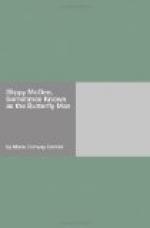That afternoon she brought the little girl with her, to make our acquaintance. When the child, shyly friendly, looked up, it seemed to me for an anguished moment as if another little girl had walked out of the past, so astonishingly like was she to that little lost playmate of my youth. Right then and there Mary Virginia walked into my heart and took possession, as of a place swept and garnished and long waiting her coming.
When we knew her better my mother used to say that if she could have chosen a little girl instead of the little boy that had been I, she must have chosen Mary Virginia Eustis out of all the world.
Like Judge Mayne’s Laurence, she chose to make the Parish House her second home—for indeed my mother ever seemed to draw children to her, as by some delightful magic. Here, then, the child learned to sew and to embroider, to acquire beautiful housewifely accomplishments, and to speak French with flawless perfection; she reaped the benefit of my mother’s girlhood spent in a convent in France; and Mrs. Eustis was far too shrewd not to appreciate the value of this. And so we acquired Mary Virginia.
I watched the lovely miracle of her growth with an almost painful tenderness. Had I not become a priest, had I realized those spring hopes of mine; and had there been little children resembling their mother, then my own little girls had been like this one. Even thus had been their blue eyes, and theirs, too, such hair of such curling blackness.
The hours I spent with the little girl and Laurence helped me as well as them; these fresh souls and growing minds freshened and revived mine, and kept me young in heart.
“We are all made of dust,” said my mother once. “But Mary Virginia’s is star dust. Star dust, and dew, and morning gold,” she added musingly.
“She simply cannot imagine evil, much less see it in anything or in anybody,” I told Madame, for at times the child’s sheer innocence troubled me for her. “One is puzzled how to bring home to this naive soul the ugly truth that all is not good. Now, Laurence is better balanced. He takes people and events with a saving grain of skepticism. But Mary Virginia is divinely blind.”
My mother regarded me with a tolerant smile. “Do not worry too much over that divinely blind one, my son,” said she. “I assure you, she is quite capable of seeing a steeple in daylight! Observe this: yesterday Laurence angered her, and she seized him by the hair and bumped his head against the study wall—no mild thump, either! She has in her quite enough of the leaven of unrighteousness to save her, at a pinch—for Laurence was entirely right, she entirely wrong. Yet—she made him apologize before she consented to forgive him, and he did it gratefully. She allowed him to understand how magnanimous she was in thus pardoning him for her own naughtiness, and he was deeply impressed, as men-creatures should be under such circumstances. Such wisdom, and she but a child! I was enchanted!”




